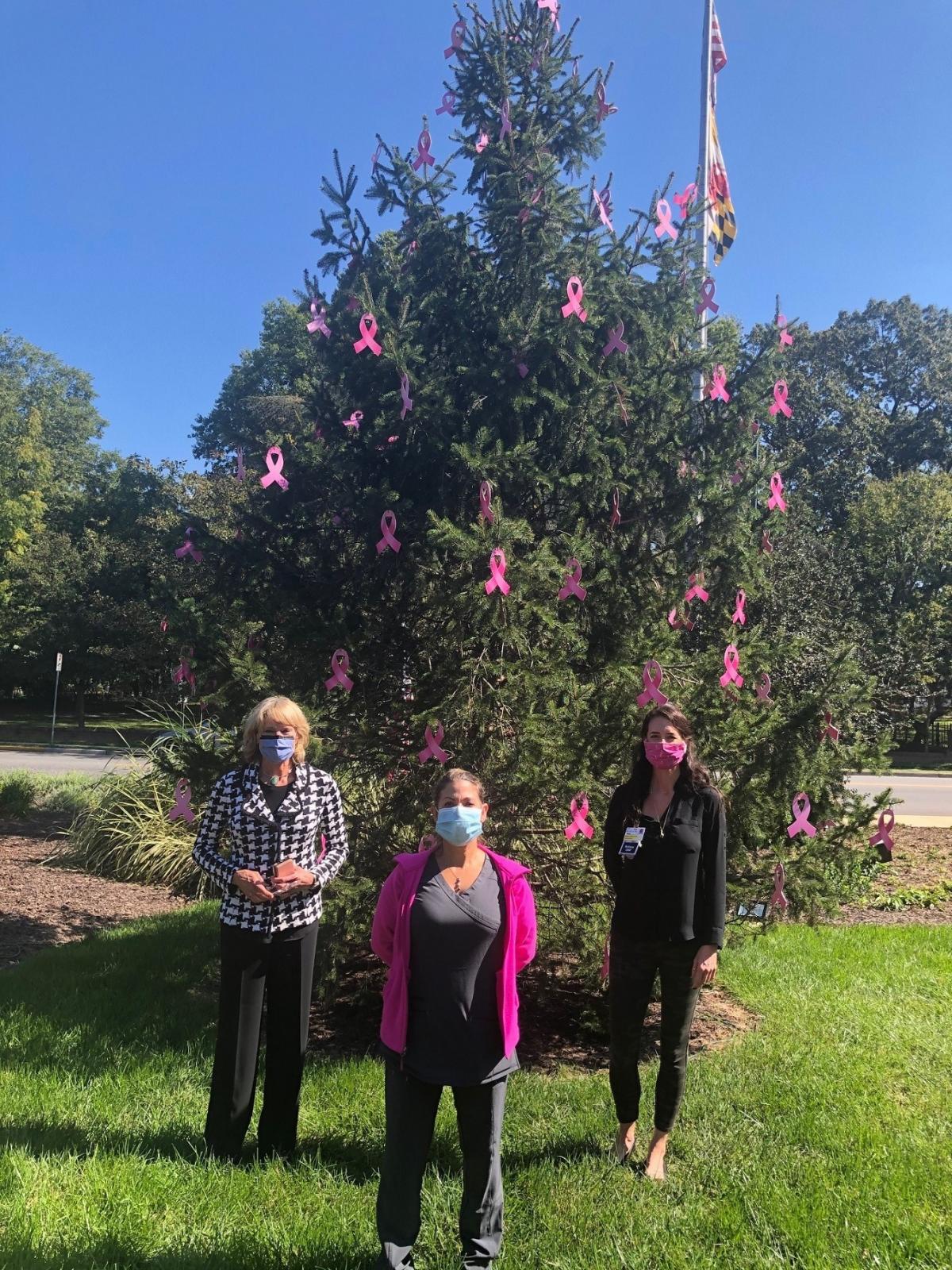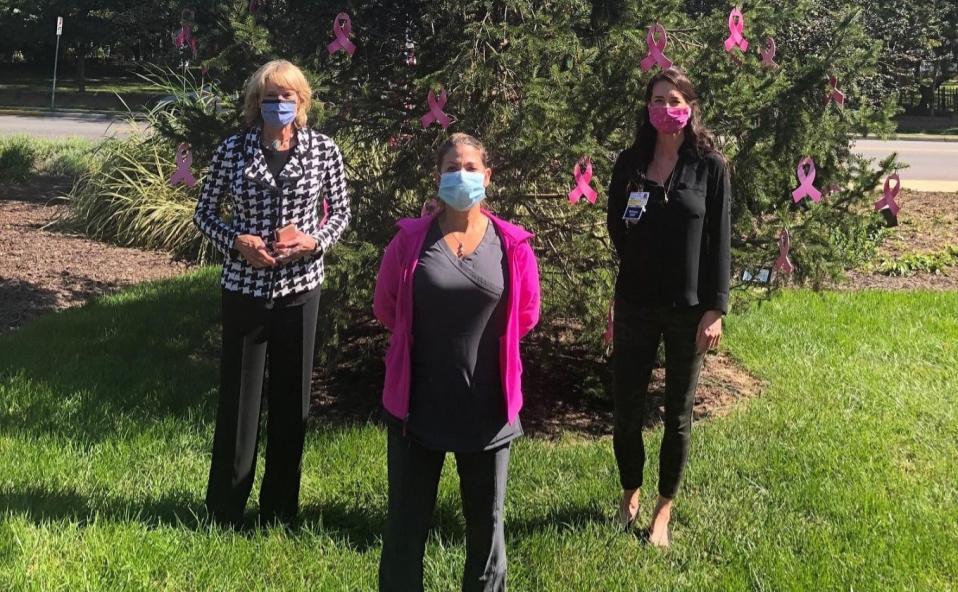 As National Breast Cancer Awareness Month, October is always a time for events and activities that promote public understanding of breast cancer diagnosis, treatment and support resources for patients. This year, while public events are precluded by the COVID-19 pandemic, providers and staff at the Clark Comprehensive Breast Center and Cancer Center at University of Maryland Shore Regional Health are eager to share the latest breast cancer information to women and men throughout Caroline, Dorchester, Kent, Queen Anne’s and Talbot counties.
As National Breast Cancer Awareness Month, October is always a time for events and activities that promote public understanding of breast cancer diagnosis, treatment and support resources for patients. This year, while public events are precluded by the COVID-19 pandemic, providers and staff at the Clark Comprehensive Breast Center and Cancer Center at University of Maryland Shore Regional Health are eager to share the latest breast cancer information to women and men throughout Caroline, Dorchester, Kent, Queen Anne’s and Talbot counties.
Breast cancer is the second-highest cause of death among women in Maryland, exceeded only by lung cancer, and breast cancer rates among residents of Maryland’s Eastern Shore are higher than the state-wide rate. According to the Cancer Center’s 2019 annual report, of 113 breast cancer cases diagnosed by the Center, 109 were women and four were men.
“We continue to emphasize the importance of annual mammograms for women aged 40 and older,” says Roberta Lilly, MD, medical director, Clark Comprehensive Breast Center. “Getting a mammogram is the best way to detect breast cancer at its earliest and most treatable stage – and even to detect breast tissue with abnormalities that may become cancerous in the future and therefore should be closely monitored.”
In addition to the Diagnostic and Imaging Center at Easton, state of the art 3-D mammography with tomosynthesis is provided for patients by appointment at the Leh Women’s Center in UM Shore Medical Center at Chestertown, and at UM Shore Medical Pavilion at Denton. UM Shore Medical Pavilion at Queenstown is expected to add this service in the coming months, and UM Shore Medical Campus at Cambridge, now under construction and scheduled for completion next summer, also will offer it.
Photo: To mark Breast Cancer Awareness Month: Clark Comprehensive Breast Center providers pause in front of the tree in the circle at UM Shore Medical Center at Easton that is decorated with pink ribbons. Left to right, Dr. Roberta Lilly, Dr. Karen Barbosa and nurse practitioner Brittany Krautheim.
Beyond mammography, there is an important new emphasis on genetic testing and counseling for breast cancer patients and also for survivors. According to breast surgical oncologist Karen Barbosa, DO, who joined the Clark Comprehensive Breast Center earlier this year, the American Society of Breast Surgeons recently revised its recommendations for genetic testing to include all women who have been diagnosed with breast cancer, including survivors who may be several years out from their diagnosis, rather than just those who have a family history of breast cancer.
“Genetic testing can reveal gene mutations that are associated with increased risk for various types of cancer,” said Dr. Barbosa. “It’s not just a question of ‘did your mother or grandmother or aunt have breast cancer,’ but how can understanding your genetic profile make you aware of possible cancer risks and inform your health care decisions? Genetic testing also can provide information that you may want to share with close relatives so they can consider whether or not they want to undergo testing themselves.”
A University of Maryland certified genetics counselor provides genetic counseling via telemedicine. The counseling appointment includes a risk assessment of your personal and familial risk factors, a review of information related to hereditary cancer genes, a discussion of cancer screening and risk reduction strategies, and a review of the benefits and drawbacks of genetic testing.
Genetic testing for Eastern Shore breast health patients is done in the Clark Comprehensive Breast Center, via a blood test or a saliva test. Results are sent to the Center and shared with the patient during a follow-up appointment.
“As providers, we go over the results in detail with our patients they will understand exactly what the implications are for their health and ask questions,” says Dr. Barbosa. “We also discuss what the results indicate in terms of their own treatment plan and their health care decisions going forward.”
The cost of the test depends on the patient’s insurance, but the Clark Comprehensive Breast Center will be participating in research studies through which the cost may be defrayed or reduced for patients who enroll. Dr. Barbosa invites women who have been treated for cancer or believe they may be high risk to request a consult regarding genetic testing and consider participating in a clinical trial.
“Even if you’ve already been diagnosed and/or treated for cancer, a genetic test can help you make critical decisions related to your treatment plan, understand how your cancer might correlate with your risk for other cancers, and consider possible lifestyle changes,” says Dr. Barbosa. “And because your test results may have implications down the line for your family members, any information you take away from a genetic screening can be helpful.”
To learn more about genetic testing and counseling services available through UM Shore Regional Health, call 410-820-9400 or visit https://www.umms.org/shore/health-services/womens/breast/cancer-education-support/genetic-counseling.
To make an appointment for a mammogram (which may require an order from your health care provider), call 410-822-1000, ext. 2600.
As part of the University of Maryland Medical System (UMMS), University of Maryland Shore Regional Health is the principal provider of comprehensive health care services for more than 170,000 residents of Caroline, Dorchester, Kent, Queen Anne’s and Talbot counties on Maryland’s Eastern Shore. UM Shore Regional Health’s team of more than 2,200 employees, medical staff, board members and volunteers works with various community partners to fulfill the organization’s mission of Creating Healthier Communities Together.




Write a Letter to the Editor on this Article
We encourage readers to offer their point of view on this article by submitting the following form. Editing is sometimes necessary and is done at the discretion of the editorial staff.